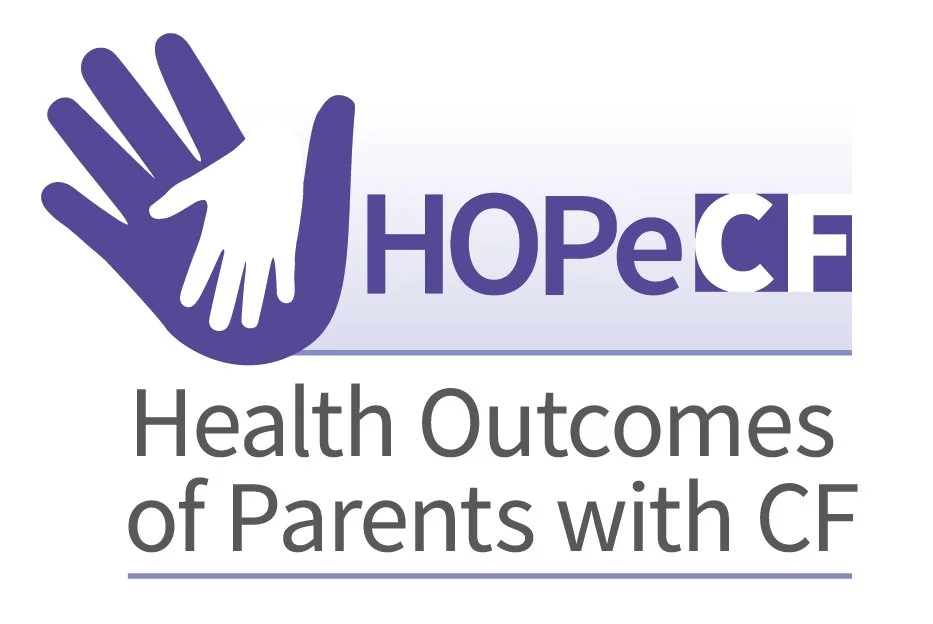
The advent and use of effective CF modulator therapies has led to more people with cystic fibrosis (CF) living longer and healthier lives, and now a growing number are considering parenthood. However, minimal information exists about how parenthood affects those with CF, limiting the ability to make informed reproductive decisions and to support those who decide to become parents.
This long-term, multicenter, observational study jointly funded by the National Institutes of Health and the Cystic Fibrosis Foundation is determining the health impact of parenthood on people with CF in the era of CF modulators and is the first, large-scale epidemiologic data collection of how becoming a parent interplays with having a chronic disease.
Throughout the 7-year long Health Outcomes of Parents with CF (HOPeCF) study, CF centers across the United States, led by the Kazmerski Lab, have come together to discover the impact of parenthood and how we can best support parents and prospective parents with CF.

In conjunction with researchers from CONVERGE at the University of Pittsburgh and Dezudio, an information design consultancy, and funded by the CF Foundation, the Kazmerski Lab developed MyVoice:CF, a web-based, patient-facing decision support tool designed to help women with CF learn about CF-specific concerns related to fertility, pregnancy, birth control, and parenting as well as help them initiate family planning conversations with their CF care team.
We have completed a feasibility trial of MyVoice:CF which assessed the acceptability and usability of MyVoice:CF among reproductive-aged women with CF. We also conducted interviews with adolescents with CF and parents to assess the acceptability of the MyVoice:CF tool for a teen population. We are also currently collaborating with international researchers on adaptations of the tool.
The Kazmerski Lab plans to conduct a larger trial assessing the impact of MyVoice:CF on reproductive health communication and key health outcomes. Future iterations of the tool should include relevant perspectives and content for people with CF of all gender identities.

This three-aim study funded by the Boomer Esiason Foundation seeks to better understand the impact of infertility on males with CF, their partners, and their families. Results will inform the future development of a patient-facing reproductive decision support tool for males with CF.
Aim 1: Through dyadic interviews we are exploring how males with CF and their partners decide to use assisted reproductive technology to build their family, including experiences and perspectives around sperm extraction, insurance coverage, and the physical and emotional impact of fertility treatments.
Aim 2: We are interviewing the parents of males with CF to understand if, when, and how they discuss infertility with their children as well as reflect on their own thoughts and emotions regarding their child’s infertility. We are exploring what role, if any, parents desire the CF team to play in educating males with CF about infertility.
Aim 3: We are interviewing males with CF about the impact CF has had on various life domains, including romantic, social, professional, and mental.

PRIDE CF is a CF Foundation-funded Health Equity Team Science initiative which is comprised of four projects with the unified goal of better understanding the interplay of being a member of the LGBTQIA+ community and living with CF.
Our team includes national and international experts in pulmonology, endocrinology, adolescent and young adult health, and mental health. We have the shared goal of improving health equity for LGBTQIA+ people with CF.
To develop system-wide equity-focused interventions, we need to gain a deeper understanding of the unique needs of LGBTQIA+ people with CF. The Kazmerski Lab is working on understanding the perspectives and practices of CF providers related to the care of LGBTQIA+ people with CF and how being LGBTQIA+ impacts CF health outcomes using data from the United States CF Foundation Patient Registry.

To address the unique and emerging needs of people with CF, the CF Foundation established a research working group to identify knowledge gaps, determine research priorities, and develop the infrastructure needed to conduct the research related to sexual, reproductive, and gender health.
Dr. Kazmerski is the current Chair of SHARING and the Kazmerski Lab is involved in many national and international initiatives and collaborative research as part of this work.





